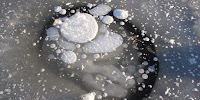A recent rapid rise in methane could damage global attempts to slow climate change through cuts in carbon dioxide emissions.
One year ago today, with huge relief, scarcely able to believe their achievement, world leaders finally agreed to reduce emissions of carbon dioxide.
But a bare 12 months later comes sobering news: atmospheric concentrations of another gas, methane, are growing faster than at any time in the last 20 years, putting further pressure on the historic Paris Agreement to deliver substantial cuts in emissions very soon.
Some scientists say the world now needs to change course and do more about methane to have a chance of keeping average global temperatures from rising by more than 2°C.
And one seasoned Arctic watcher says the changes there in the last decade are altering a system which has remained intact since the Ice Age.
Methane is the second major greenhouse gas, with agriculture accounting for 40% of emissions. Over a century it is 34 times more powerful as a greenhouse gas than carbon dioxide (though far less abundant), but over 20 years methane is 84 times more potent than CO2.
In an editorial in the journal Environmental Research Letters, an international team of scientists reports that methane concentrations in the air began to surge around 2007 and grew steeply in 2014 and 2015. In those two years concentrations rose by 10 or more parts per billion annually. In the early 2000s they had been rising by an annual average of 0.5 ppb.
Mitigation possible
...
Peter Wadhams, emeritus professor of ocean physics at Cambridge University, says scientists are now seeing large plumes of methane escaping from the shallow seas north of Siberia. These emissions, and those from the thawing tundra, are contributing to the sudden rise in methane concentrations.
Professor Wadhams devotes part of his new book A Farewell to Ice to the subject. He told the Climate News Network: “The methane being released now, at an accelerating rate, could easily negate the carbon reductions we are making.
“A Russian expedition which returned from the Arctic recently estimates there’s so much methane in offshore sediments that if it all escaped it would mean an immediate temperature rise of about 0.6°C. And there’s quite a big chance of a total melt.
“I’ve been going to the Arctic for over 40 years, and this is entirely new. The melting sea ice has allowed the water temperature to rise to 7°C since about 2005, affecting the permafrost which had till then remained unchanged since the Ice Age. The methane plumes are an amazing sight, a mass of bubbles erupting from the sea surface.”
And releases of methane from the sea floor are not restricted to the shallow Arctic waters: one of the places they are occurring as well is in the north Pacific.
Read more at Methane’s Rapid Spurt Risks Climate Curbs Plan

how to stop global warming?
ReplyDeletecutting-edge technology